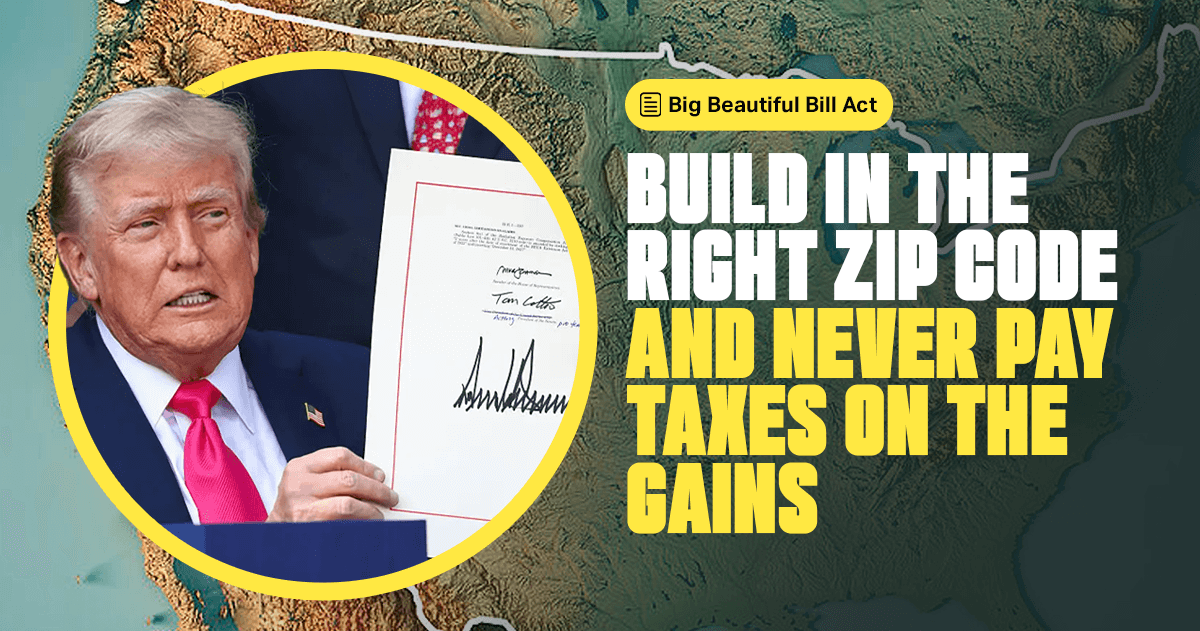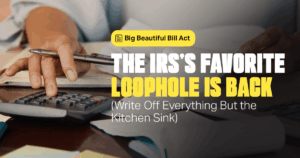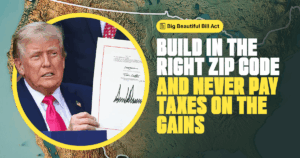Want to know the difference between rich people and everyone else? Rich people understand that where you invest matters almost as much as what you invest in.
I’ll never forget the day I learned this lesson the hard way. I had just sold a side business for about $150K—decent money for a guy who grew up thinking a $20 bill was a fortune. I’m sitting there feeling pretty good about myself until my accountant drops the bomb: “Congratulations, you owe Uncle Sam about $45,000.”
Forty-five grand. Gone. Just like that.
“Isn’t there something I can do?” I asked.
“Well,” he says, “you could have invested those gains in an Opportunity Zone and deferred the taxes.”
“A what now?”
That’s when I learned that the government actually incentivizes you to invest in certain zip codes—the ones that need help the most. And here’s the kicker: if you play it right, you never pay taxes on the gains. Ever.
I didn’t grow up on the right side of money, so when someone tells me there’s a legal way to turn tax problems into wealth-building opportunities while helping communities that look like the one I came from, I’m all ears.
Trump’s Big Beautiful Bill just took Opportunity Zones and turned them into Opportunity Zones 2.0. It’s like they took a Ferrari and strapped a rocket to it.
Here’s how this works, and I’m going to explain it like you’re sitting at my kitchen table, not in some fancy boardroom:
- First, you need capital gains. That’s profit from selling stocks, crypto, real estate, or a business. Let’s say you made $100,000 selling something.
- Second, instead of paying taxes on that $100K, you roll it into a Qualified Opportunity Fund within 180 days. Think of this fund like a special savings account that only invests in designated low-income areas.
- Third—and this is where it gets beautiful—you hold that investment for 10 years. When you sell, all the gains from your Opportunity Zone investment are completely tax-free. Not tax-deferred. Tax-free.
But here’s what’s new and why 2.0 changes everything:
They tightened up the rules so you can’t game the system. No more investing in some gentrified neighborhood that happens to qualify on a technicality. We’re talking about places where the median income is 70% or less of the surrounding area—real communities that actually need investment.
And here’s the part that’ll blow your mind: If you invest in rural areas through something called a Rural Qualified Opportunity Fund, you get a 30% step-up in basis after just five years instead of the standard 10%. That means if you put $100K into a rural opportunity zone, after five years, the IRS pretends you only put in $70K for tax purposes.
How many of you are sitting on gains right now, dreading the tax bill? How many of you have been thinking about selling that stock, that crypto, that rental property, but you’re paralyzed by what you’ll owe?
You see what I mean? This isn’t just about avoiding taxes—this is about redirecting money that would have gone to the government into communities that actually need it.
Think of it like this: The IRS is standing there with their hand out for your capital gains taxes. You can either give them that money and get nothing in return, or you can invest it in an area that needs help, potentially double or triple your money over 10 years, and pay zero taxes on the gains.
The math ain’t mathin’ if you’re still writing checks to Uncle Sam when you could be building wealth instead.
Let me paint you a real picture. Say you’ve got $200K in gains from selling stock. You’re looking at about $60K in taxes. Instead, you roll that $200K into an Opportunity Zone property in a rural area. After five years, your basis steps up 30%, so you’re only on the hook for taxes on $140K of the original gain. After 10 years, let’s say your investment grew to $500K. You pay zero taxes on that $300K gain. Zero.
Meanwhile, you just helped revitalize a community, created jobs, and built something that matters.
This isn’t just about money, though. This is about taking neighborhoods that have been forgotten—places where kids grow up thinking success means getting out instead of building up—and giving them a shot at something better.
I’m not doing this for applause, but I’ve seen what happens when investment flows into the right places. I’ve seen abandoned buildings become thriving businesses. I’ve seen young people start believing their hometown has a future.
Money is a game, but this game actually has heart.
You create gains, you reinvest strategically, you deduct what you can, and you multiply what matters most—community wealth, generational change, and your own financial freedom.
So here’s my challenge: Stop thinking like someone who accepts whatever tax bill the government hands you. Start thinking like someone who understands that the best investments help others while helping yourself.
The shoebox mentality says “pay your taxes and hope there’s something left.” The Opportunity Zone mentality says “invest where it matters and never pay taxes on the gains.”
Which investor are you going to be?



